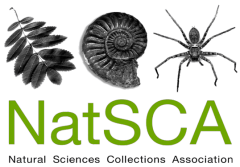Making a Difference: Showing the Positive Impact of Natural History Collections
On May 8th and 9th 2025, NatSCA hosted 'Making a Difference: Showing the Positive Impact of Natural History Collections', the 2025 NatSCA Conference at the Manchester Museum.
This conference was recorded and can be viewed online on our YouTube channel. [External Link]
The description of each YouTube video contains the abstract for the talk.
Day 1 - May 8th 2025
Welcome
Welcome
Esme Ward and George Young, Manchester Museum, University of Manchester
First Session - Lightning Talks
Opening the doors: presenting natural history collections to the public
Grace Flanagan: Royal Botanic Gardens, Kew
Engaging for impact: how the digitisation team is reaching stakeholders in the margins
Glory Turnbull: Natural History Museum, London
Balancing resources and responsibilities: strategies for curator-led public engagement
Beatriz Vieite: University of Aveiro, Portugal
Cue the Kew internship
Clare Drinkell: Royal Botanic Gardens, Kew
Making an exhibition of ourselves: displaying and not displaying human remains in the Grant Museum
Hannah Cornish: Grant Museum of Zoology, University College London
Bringing digital collections to the social media masses: 80 million specimens, with at least as many stories
Skye Neal: Natural History Museum, London
Utilising plant traits from herbarium collections and species descriptions to enhance conservation efforts in southeast Asia's biodiversity hotspots.
Alison Moore: Royal Botanic Gardens, Kew
A time capsule of extinction: Scottish wildlife in taxidermy
Caitlin Jamison: Montrose Museum, Scotland
Second Session - Education & Accessibility
Addressing accessibility: ideas for inclusive natural history displays
Anna Massignan: National Museum of Ireland – Natural History
Nature needs everyone’s help, and the Real World Science network are working together to help it thrive!
Fareeda Atwan: Natural History Museum, London
A new museum display for the blind: does it make a difference?
Claire Smith, Amanda Callaghan, Caitlin Walton, and Emma Dunford: Cole Museum of Zoology, University of Reading
Third Session - Colonial Legacies
The colonial legacies of natural history collections: specimens from the Caribbean as a case study
Patricia Torres-Pineda: Museo de Historia Natural "Eugenio de Jesús Marcano" & University of Michigan Museum of Zoology
Hidden hands in colonial natural histories: lessons from four case studies at McGill
Anna Winterbottom & Victoria Dickenson: McGill University, Montreal, Quebec
“Altering the face of nature”: connecting Liverpool’s natural history, heritage and institutions
Deana Heath: University of Liverpool
A visitor intrudes and decolonises natural history: a not so scientific perspective?
Su Liu: University of Sheffield
Fourth Session - Discussion Panel
Indigenous Perspectives on Natural Sciences at Manchester Museum
Dr Alexandra Alberda and Georgina Young, Manchester Museum
Day 2 - May 9th 2025
First Session - Collaboration, Digitisation, & Sustainability
Ways to skin a (large) cat: re-establishing relationships between live and dead collections
Emma Murphy: National Museum of Ireland – Natural History
The hosted portal of the Arctic University Museum of Norway, an example of how to provide open access to natural history collections
Vanessa Pitusi & Andreas Altenburger: The Arctic University Museum of Norway
DiSSCo UK – unlocking impact from the UK’s natural science collections
Helen Hardy (NHM), Vincent Smith (NHM), Laurence Livermore (NHM), Sally Jennings (NHM), Tao Tao Chang (AHRC), & David Selway (AHRC): The Natural History Museum London and the Arts & Humanities Research Council
KISS* at the Dead Zoo [*keep it simple & sustainable]
Paolo
Viscardi & Aoife Hurley: National Museum of Ireland – Natural History
Second Session - Repatriation
Kākāpō, Kiwi and Tūī fly home: Colchester Museums’ repatriation of culturally significant bird specimens to Aotearoa New Zealand
Sophie Stevens & Ricky-Lee Erickson: Colchester Museums and Tāmaki Paenga Hira, Auckland War Memorial Museum
A restitutive commitment to community and to the natural environment through storying with natural history collections
Pauline Rutter: Independent Academic & Archival Artist
Natural history repatriations: how and why to do it
Mike G. Rutherford: The Hunterian, University of Glasgow
Third Session - Stories our Collections Tell
Women of the Riverflies: researching under-represented female naturalists and collectors in the NHMUK’s Ephemeroptera, Plecoptera and Trichoptera collections: enriching party data in the museum’s collection management system and increasing women’s public profiles by creating Wikipedia biographies
Louise Berridge: Natural History Museum, London
Nature’s memory: how natural history collections help save
the world
Jack Ashby: University Museum of Zoology, Cambridge
Reimagining the collections of Thomas Pennant at the Natural History Museum
Stephanie Holt: Natural History Museum (Curious Travellers Project), London
